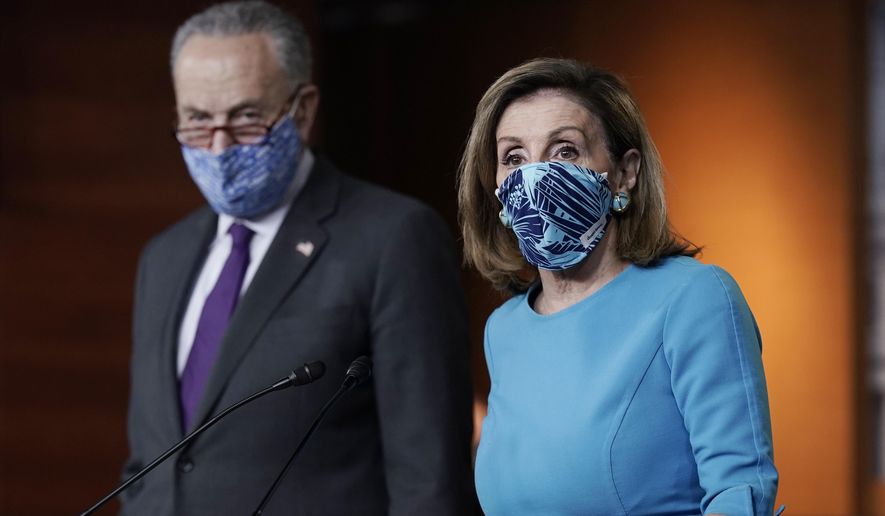The Democrats’ rush to draft a $3.5 trillion social-welfare spending bill has spurred an onslaught of lobbying by a vast array of interests from the energy industry to immigration hawks.
Insiders describe it as “historic levels of lobbying” and say effort is notably intense upon the more moderate Democrats in the House and Senate. Those moderates are viewed as the weak link in a legislative process the Democratic majority is using to force the package through Congress without Republican votes.
“It’s all hands on deck,” said Elizabeth Vella Moeller, the chief lawyer-lobbyist at Washington firm of Pillsbury Winthrop Shaw Pittman. “We are navigating historic levels of lobbying and regulatory opportunities in Washington.”
A top issue creating a rift among Democrats — and an opportunity for lobbyists — is the debate over how much to spend and how hard to push utilities to end the use of fissile fuels.
An insider at the American Petroleum Institute, the oil industry’s main lobbying group, told The Washington Times that their lobbyists will be “actively involved” in steering the legislation.
The group wields influence across Capitol Hill, including by contributing last year to the campaigns of 26 House Democrats.
“A lot of rubber is going to be meeting the road in a very short amount of time,” one House Democratic aide said privately.
Complicating the Democrats’ push to pass a one-party bill is the razor-thin margins in both chambers. It will take just five House Democrats or a single senator to hold up the bill.
The spending, which would be the biggest expansion of the social safety net since the Great Society of the 1960s, is a top priority for President Biden and other Democratic leaders. They see it as essential for the party to have any chance of holding on to control of Congress in next year’s midterm elections.
Congress is expected to pass a measure, but the next couple of weeks will decide how big it will be and how much it will restructure the U.S. economy.
“This is going to be a high-wire act that [House Speaker Nancy] Pelosi, [Senate Majority Leader Charles E.] Schumer and the entire caucus is going to have to perform, with a number of challenges,” said Nick Rathod, a Democratic political consultant who was White House deputy director of intergovernmental affairs under President Obama. “How are you going to pay for it? Even if that includes tax increases on the wealthy there are going to be some moderate Democrats who are going to bristle at that.”
Democrats on the far left are adamant about not shrinking the proposal because $3.5 trillion already isn’t enough.
U.S . Chamber of Commerce President and CEO Suzanne Clark vowed that the group will “do everything we can to prevent this tax-raising, job-killing reconciliation bill from becoming law.” The Chamber contributed to the campaigns of 65 Democrats in the House and nine in the Senate last year, according to the Center for Responsive Politics, a nonprofit that tracks campaign contributions.
The National Federation of Independent Business also promised to run “targeted traditional and digital advertising” to fight the proposal’s tax hikes to small businesses.
Some lobbyists say they are as much as 70% positive that Democrats will lower the size of the spending proposal. The fight will then be about what will get cut.
Another looming battle is a proposal to create a path to citizenship for some illegal immigrants. Those eyed for citizenship include so-called Dreamers who were brought illegally to the U.S. as children and grew up as Americans. Democrats also want a citizenship opportunity for refugees and illegal immigrants who work on farms and other essential jobs.
Groups opposed to weakening immigration laws have vowed to put the heat on Democrats in swing districts, such as the suburban Atlanta district represented by Rep. Carolyn Bourdeaux.
R.J. Hauman, government relations director at the Federation for American Immigration Reform, said the group will ramp up ads like one earlier this year that asked voters to “tell Rep. Bourdeaux to stop encouraging illegal immigration.”
The ad said that easing the laws will invite more illegal immigrants to try to enter the U.S. illegally amid what’s already a surge at the nation’s borders.
Chris Chmielenski, vice president and government relations director for NumbersUSA, which advocates for reducing immigration, is preparing an advertising blitz in swing districts. The ads will make the case that allowing illegal immigrants to become citizens will lead to them petitioning for their family members to come to the country and compete for jobs, according to the group.
The pharmaceutical industry is also intensely lobbying Democrats to stop a key piece of the plan that would push drug companies to lower the prices for Medicare patients, which supports say would save $456 billion.
A source familiar with the negotiations around the bill said talks are ongoing over the industry’s warnings that it will have less money to develop new cures. “There are members who are wrestling with the trade-offs of government negotiations and what it will mean for their constituents,” the source said.
An AARP spokeswoman, though, said, the group will be running a seven-figure ad campaign this month. The ads, touting the importance of reducing drug prices for seniors, will target Democrats on the House committees that hand health care and tax policies.
Energy sector lobbyists say Democrats seem to have settled on the idea of offering subsidies to utilities in return for a promise to produce 80% of its electricity using “clean energy.” But still unresolved is what happens to utilities that refuse and what counts as clean energy.
A coalition of environmental groups this week demanded the subsidies go only to utilities that produce power using methods like wind and solar, but not natural gas. The oil and gas industry, which is a big contributor to Democrats in energy states like Texas, wants natural gas included.
• Kery Murakami can be reached at kmurakami@washingtontimes.com.




Please read our comment policy before commenting.